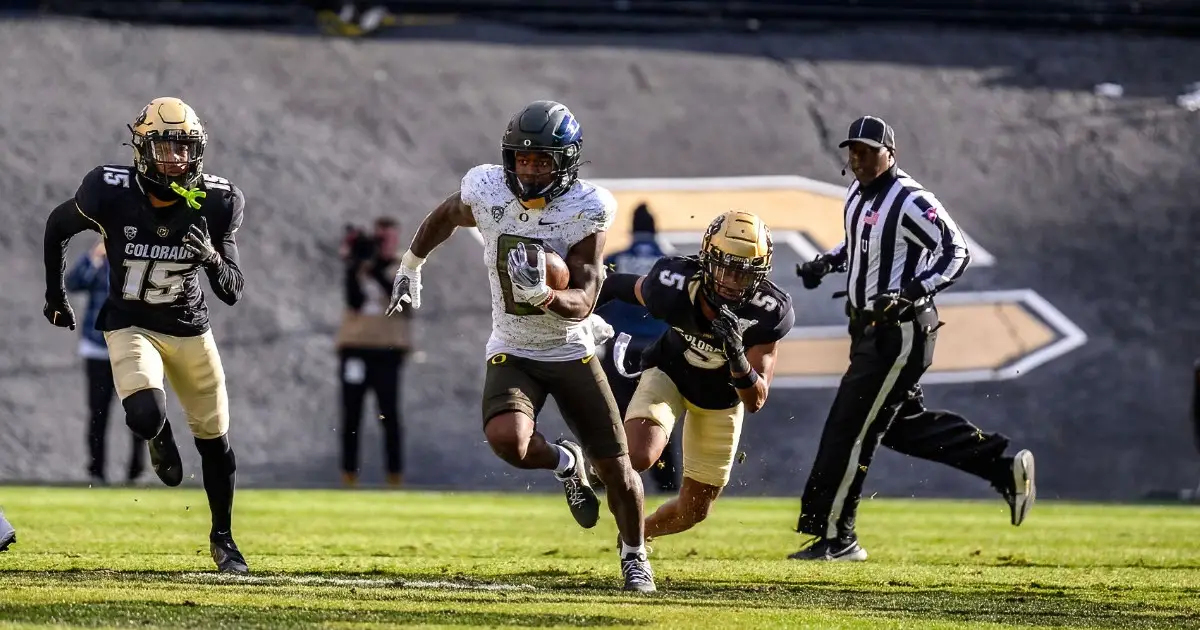We are back in the midst of conference realignment with Colorado bolting for a home in the Big-12 and everyone is waiting for the next domino to fall. Will it be Oregon to the B1G or the Big 12, or does Oregon stay in the Pac-whatever? It honestly doesn’t matter; Oregon is going to be fine.
How could I possibly say this?
The powers that be at Oregon are going to look at their financial situation and their goal for their football program and other sports to let that determine their next move. For football that goal is to win a national championship, so those involved at Oregon are going to pursue that goal in the best way they can for the Ducks.
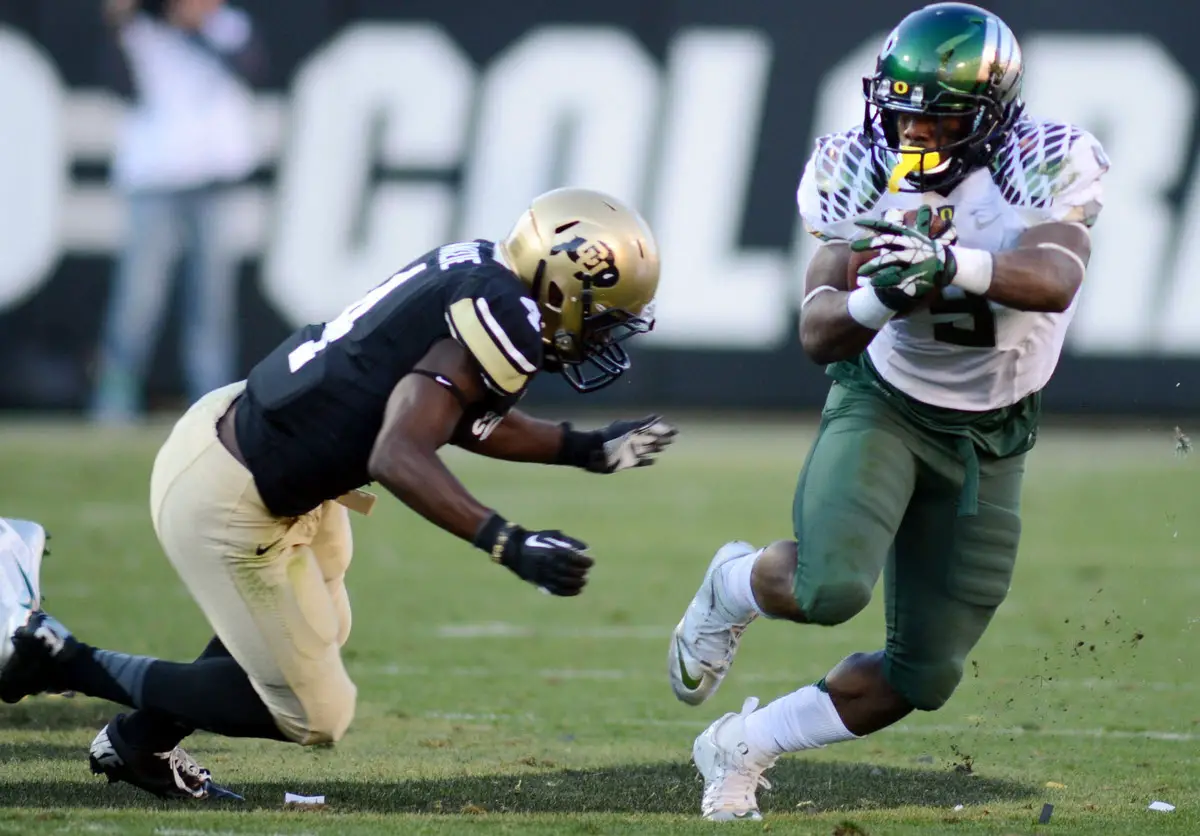
Byron Marshall runs against Colorado in 2013. (Photo by Cliff Grassmick)
Does that mean Oregon makes the jump to the B1G? For some fans that is their dream scenario, though personally it is not mine. It’s a possibility, but the big determining factor comes down to FOX and whether or not they want this, as many schools in the B1G aren’t too keen on west coast travel.
What about the Big 12? The conference seems far more unlikely because it has all the travel burden of the B1G but half the payout, or roughly the same payout as the Pac-12 should get out of a media deal.
We don’t have any significant insight into Oregon’s finances, but we do know that Oregon’s athletics managed to make 12 million dollars last year — which led the conference in terms of net revenue. Remember, making money is the goal for athletic departments. I went into depth in my article about a month ago where I was not convinced moving to the B1G was the way to go. Athletic departments that can make money can take that money and reinvest it into the school, and Oregon is currently able to do just that.
Oregon’s Donors
On the facilities front, Oregon is still leading the charge across the county as they’re in the process of constructing a new indoor practice facility. Beyond that, Dan Lanning just received a major raise in his contract extension through 2028. This raise was only made possible because of Connie and Steve Ballmer, who also purchased the old Concordia University campus in northeast Portland as the new University of Oregon Portland campus. Oregon has deep-pocketed donors who are happy and willing to help fund Oregon sports and athletic facilities to ensure Oregon stays relevant.
However, let’s not mistake their willingness to support the Ducks with their desire to fund Oregon athletics on their own, because they will not. Though in the same vein they will not allow Oregon to be left behind if the Pac-12 were to fold. Oregon is the biggest brand in the Pac-12 right now and one of the biggest in the entire country, and in any conference realignment the Ducks are not going to be left out. Oregon’s influential donors won’t allow that to happen either, especially Phil Knight.
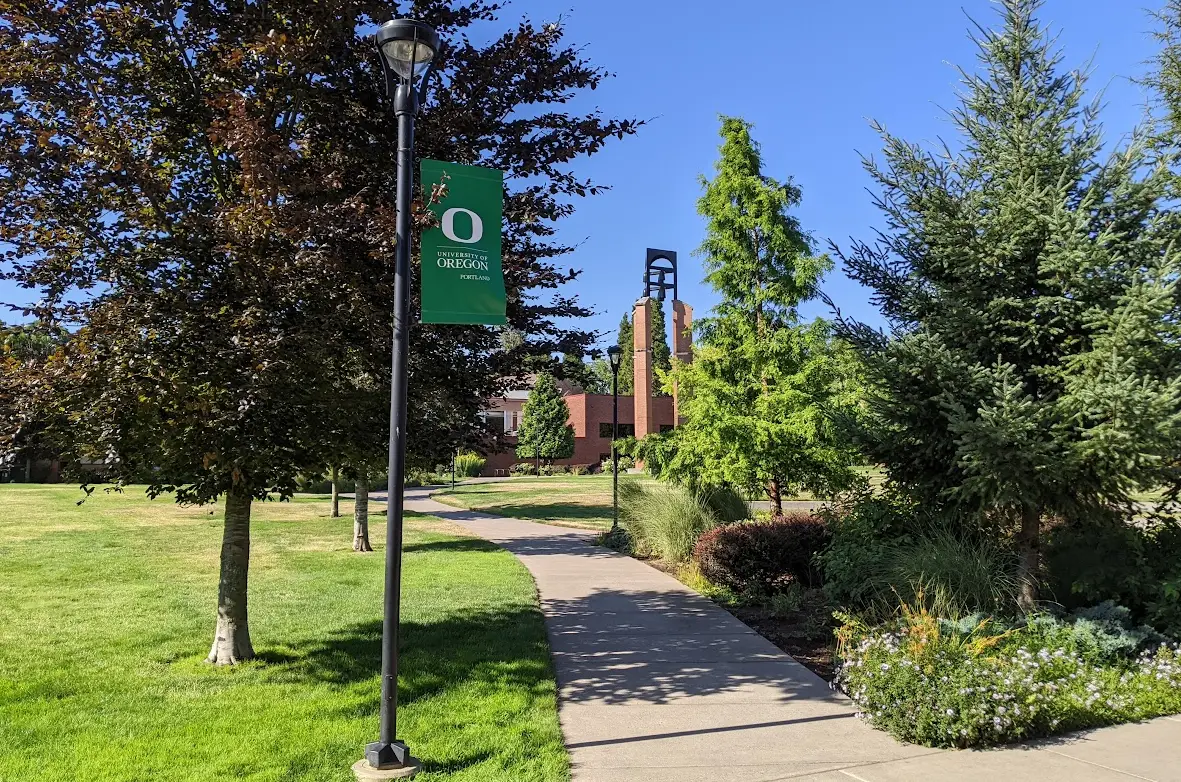
The University of Oregon’s new Portland Campus (Photo by David Marsh)
What About NIL Money?
I have seen this come up across many sites and it is frustrating. It doesn’t matter what conference Oregon is in when it comes to NIL because NIL doesn’t go through the schools. Schools are not allowed to pay players outside of the scholarship package. So it doesn’t matter if Oregon is in the Pac-12, B1G or even the Mountain West; the school can’t pay players. NIL money comes from third parties that pay players for use of their Name, Image and Likeness.
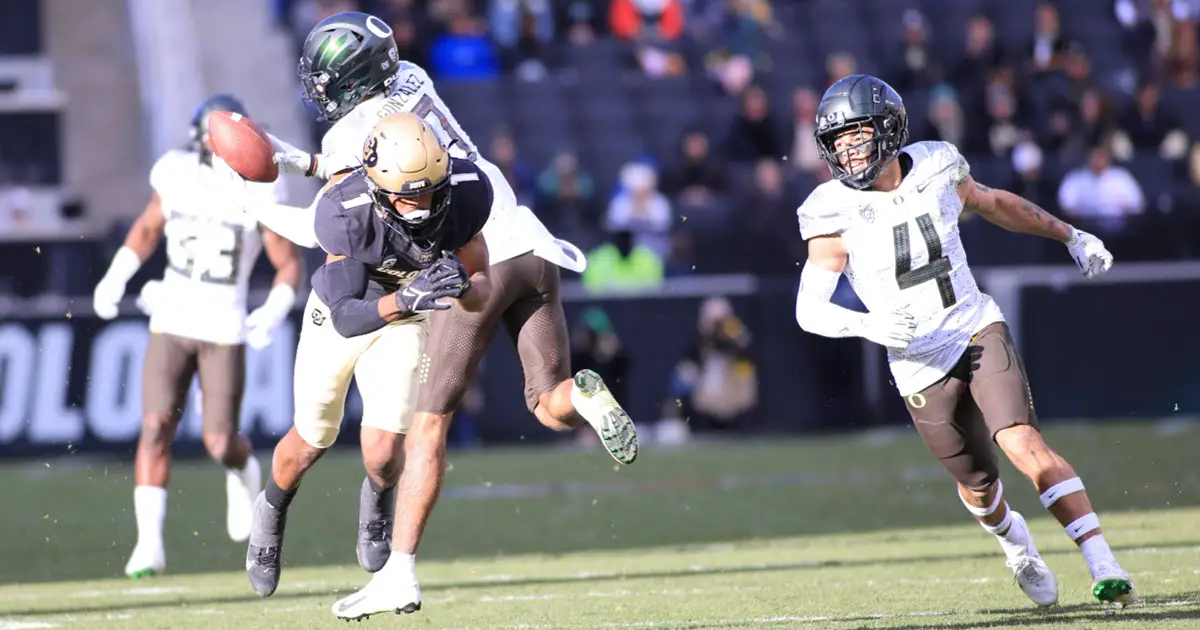
Last year’s contest against Colorado was a big game for Christian Gonzalez, (No. 0) and Bennett Williams (No. 4) in the secondary. (Photo by Harry Caston)
Division Street is the biggest NIL collective associated with Oregon and they will continue to do their work regardless of what conference they are in, as the mission of the Oregon football program is to win a national championship — and whichever conference gives Oregon the best route to the playoff and the national championship is all that matters to Division Street.
What if Oregon Stays in the Pac?
To many this feels like a doomsday scenario, but take a moment and breathe. What has changed since last week? Colorado has left the conference and that’s it. Colorado leaving the Pac-12 is an emotional gut punch, but it’s not a death sentence.
What has Colorado honestly done for the Pac-12 conference besides bring in the Denver market? A market that, by the way, hasn’t been interested enough in the conference for the Buffaloes to bother selling out season tickets until they hired Deion Sanders as their head coach in football this past off-season.
Colorado has been the weakest link in the Pac-12 in terms of on-field and on-court production by a long shot. In terms of football, the best season Colorado put together in the Pac-12 to date was 2016 when they won the Pac-12 South only to get beat by Washington in a rather one-sided championship game.
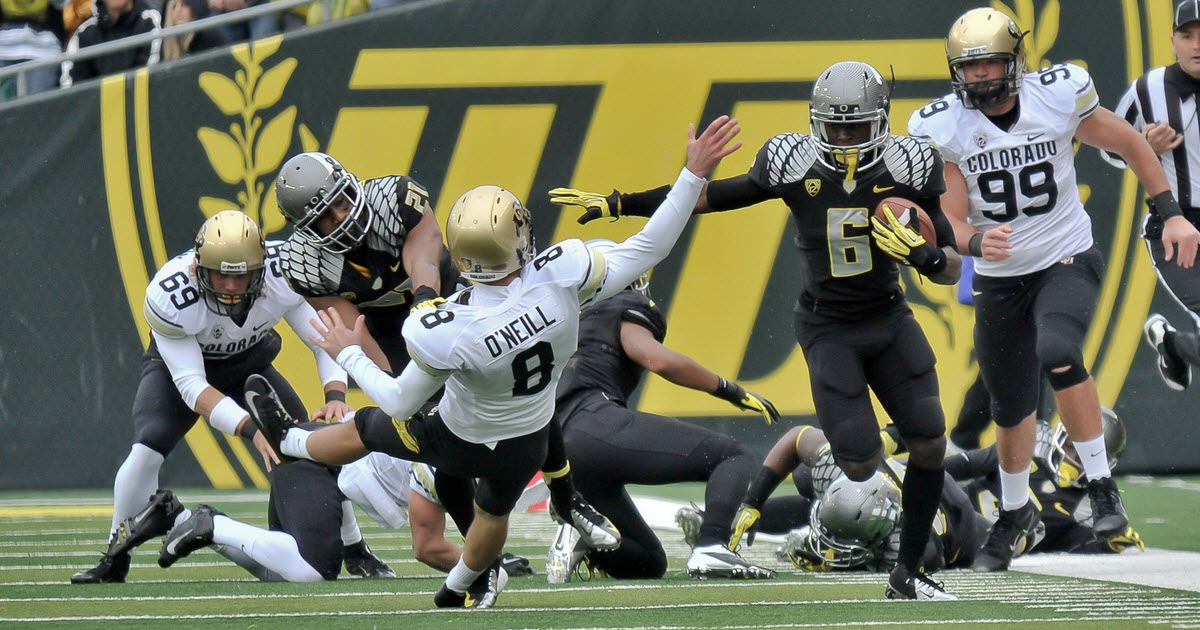
De’Anthony Thomas runs against Colorado in 2012. (Photo by Kevin Cline)
Losing Colorado is a blow and there is no denying that, but in terms of teams the Pac could afford to lose at this point, oddly enough Colorado is the least consequential. Colorado is going back to the Big 12 where they think they can be relevant again because they know they can’t be relevant in the Pac 12.
What does change for the conference right now is that the Pac-12 is going to have to find three teams instead of two to expand with. This assumes that Oregon and Washington don’t bolt. San Diego State and SMU are both targets for expansion. And with Colorado’s departure, the conference will have to look to a third school — and there are many who have applied to join the Pac-12, so the conference gets to pick the best fit. Whether that is to remain in Colorado by going after Colorado State or looking to expand into Texas by going after University of Texas San Antonio or Rice University, there are plenty of options for the conference (though sadly none are Power Five).
What About the Playoff?
Recently Josh Pate on Late Kick basically said that with Colorado’s departure the Pac-12 will be diminished and that might lead to its fall. Well, as stated above this isn’t a certainty from the loss of Colorado — realistically, the loss of the L.A. schools is far more of a blow in that regard. His primary reason was that after the 2025 season, he believes it will be unlikely that there would be any more auto-bids for conference champions and that could block the Pac-12 out of the playoff entirely.
That is probably unlikely, unless the College Football Playoff Committee drastically changes their criteria for teams eligible to make the playoff. The recipe for making the four-team playoff has been undefeated or one-loss conference champions, and then filling in the rest of the slate with the best-looking one-loss teams. Typically the bigger brands are included in this selection process because they’ll bring the most eyeballs.
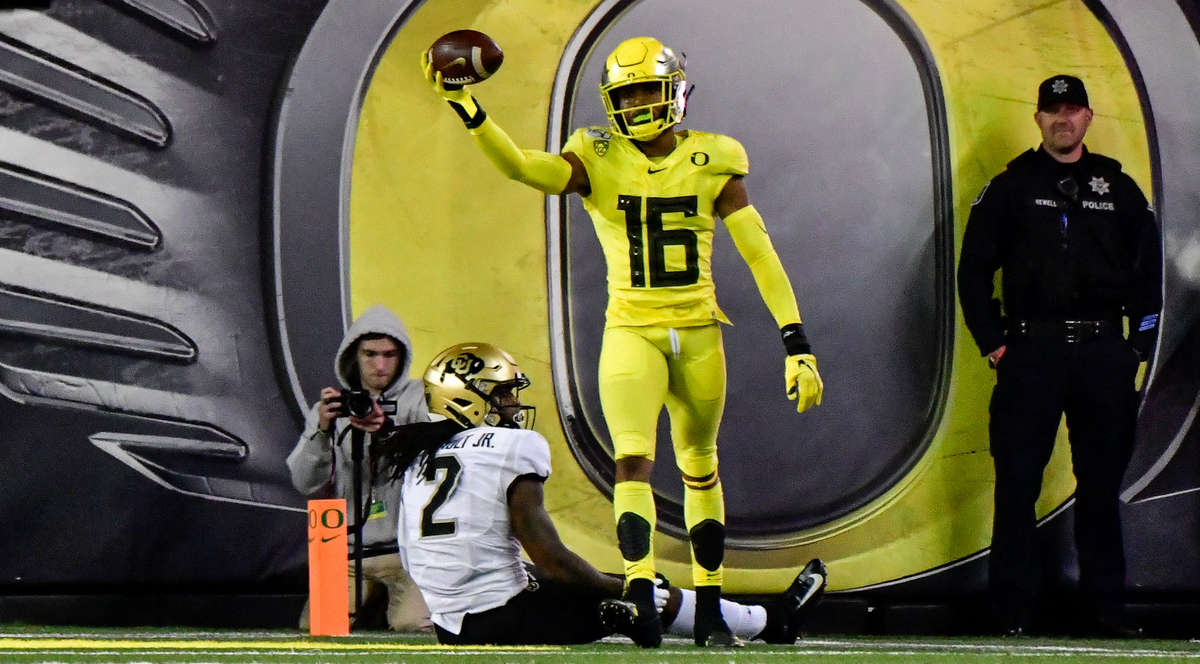
Nick Pickett picks off Colorado in 2019. (Photo by Eugene Johnson)
Getting through the season with only one loss is already difficult, but that is Oregon’s easiest way to the playoff regardless, so that standard doesn’t change as one-loss teams should be ranked within the Top 12. There aren’t that many one-loss teams in any given season and there are certainly not 13 of them. There will be some two-loss teams included in the playoff selection as well.
If we take the 2019 season as an example, the Pac-12 would have actually had two teams reach the playoff. Oregon and Utah and both had two losses but were ranked within the Top 12 at the end of the season. In more recent years the conference has been an outright bloodbath, but the two-loss conference champion would have been around No. 12 at the very least.
These standards are obtainable for Oregon or any other school in the Pac-12, and as we saw with Clemson in the ACC, being in a weak conference doesn’t block a team from getting into the playoff if they go undefeated. With a 12-team playoff the standard becomes one-loss, which isn’t unreasonable.
Deep Breath
Whatever Oregon chooses to do, they will be just fine. If they go to the B1G or Big 12 it will probably make a section of the fan base elated who believe any conference is better than the Pac-12, and in terms of management these days it’s a bit difficult to argue against that. However, Oregon can survive just fine in a Pac-12 as long as they take care of business and win the big games when they get them.
We don’t know what is going on behind closed doors. We may think we have the answers, but we don’t. We have opinions and our own desired outcomes, but for our Ducks there are those at the University and wealthy donors associated with the University who are going to push what is best for Oregon’s athletics with the explicit goal being to win a National Championship.
So take a deep breath. Our Ducks are going to be just fine.
David Marsh
Portland, Oregon
Top Photo By Craig Strobeck

Natalie Liebhaber, the FishDuck.com Volunteer Editor for this article, works in the medical technology industry in SLC, Utah.

David Marsh is a high school social studies teacher in Portland, Oregon. As a teacher he is known for telling puns to his students who sometimes laugh out of sympathy, and being both eccentric about history and the Ducks.
David graduated from the University of Oregon in 2012 with Majors in: Medieval Studies, Religious Studies, and Geography. David began following Ducks Football after being in a car accident in 2012; finding football something new and exciting to learn about during this difficult time in his life. Now, he cannot see life without Oregon football.

